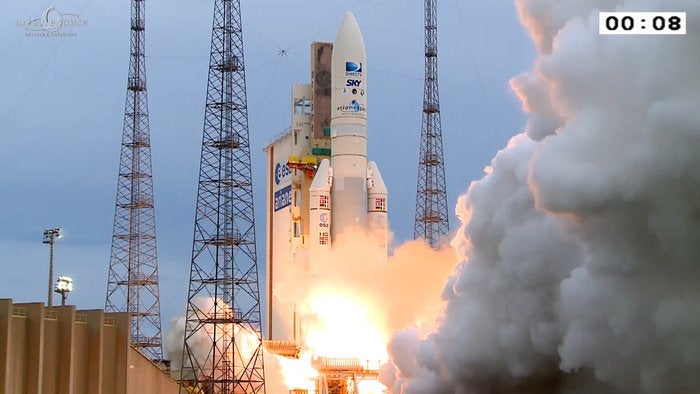
DirecTV-15 and Sky Mexico-1 satellites have successfully been lifted-off aboard an Arianespace’s Ariane 5 from spaceport in Kourou, French Guiana.
Designated flight VA223, the launch is the 79th Ariane 5 mission, and the second for the Ariane launcher.
After 28 minutes of flight, the upper passenger in payload arrangement, DirecTV-15, was released into its transfer orbit.
Following a series of burns by Ariane’s Sylda structure, the co-passenger Sky Mexico-1 was jettisoned into its orbit around ten minutes after the first satellite.
With a mass of around 6,200kg, DirecTV-15 is designed to operate from up to five different orbital positions between 99° W to 119° W in geostationary orbit.
The satellite will serve the continental US, Alaska, Hawaii and Puerto Rico with HD and 4K UHD direct-to-home TV broadcast services through Ku-band and Ka-band communications.
How well do you really know your competitors?
Access the most comprehensive Company Profiles on the market, powered by GlobalData. Save hours of research. Gain competitive edge.

Thank you!
Your download email will arrive shortly
Not ready to buy yet? Download a free sample
We are confident about the unique quality of our Company Profiles. However, we want you to make the most beneficial decision for your business, so we offer a free sample that you can download by submitting the below form
By GlobalDataSaid to be the most powerful broadcast satellite of its kind in the US, DirecTV-15 is produced by Airbus Defence and Space, based on its Eurostar E3000 platform.
Owned and operated by Sky Mexico, the Sky Mexico-1 will operate from 78.8° W in geostationary orbit and will offer HD direct TV broadcast services to Mexico, Central America and the Caribbean markets.
Built on Orbital ATK’s GEOStar-2 platform, the satellite features Ku and R-band transponders. Both have a design life of about 15 years.
Flight VA223 is the fourth for Arianespace this year, with one mission each for Ariane 5, Soyuz and Vega.
In April, Ariane 5 launched Telenor Satellite Broadcasting’s (TSB) THOR 7 and Telespazio’s SICRAL 2 satellites. Soyuz carried two Galileo full operational capability satellites in March, while Vega was used with Europe’s IXV spaceplane in February.
Arianespace intends to complete 11 missions this year based on the availability of payloads using its three launchers.
The company is preparing for its Vega Flight VV05 on 22 June, to lift-off Sentinel-2A payload, Earth observation satellite series for the Copernicus programme.
Image: Ariane 5 flight VA223 lifting-off from the spaceport in French Guiana. Photo: courtesy of ESA.


